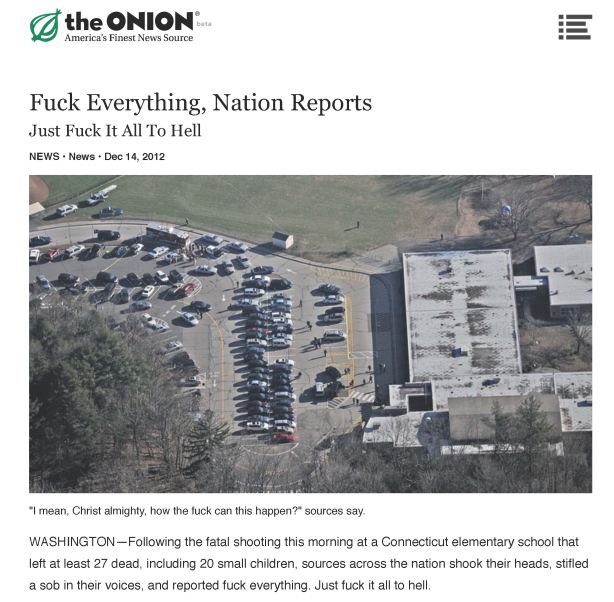The most famous edition of the satirical newspaper The Onion has to be its 9/11 edition. That issue was also the first that they published after relocating from Madison, Wisconsin, to New York City. The headlines were shocking to a nation that had not yet returned to its usual fare of late night shtick or our then-new love of “reality” television. (Survivor premiered the year before and American Idol began the year after.)
The Onion writers, however, did not leap into addressing the attack with abandon. According to Onion John Krewson, the humorists were stymied until one of them suggested the headline “America Turns into a Bad Jerry Bruckheimer Film,” after which the dam burst and they felt capable of turning a comic eye on a national tragedy.
Knowing this, should we be surprised that The Onion has already covered the horror of the Newtown, Connecticut, massacre? Here is a snippet from an article they published on Friday, the very day of the shootings.
As with 9/11, The Onion attempts to signal their understanding of the seriousness of the situation by employing epithets. Still, there are multiple ways in which The Onion’s response to Newtown differs from their earlier response to 9/11. For one, the fact that the Newtown victims were predominantly children makes for a greater risk of looking like one is taking a light-hearted perspective on the heavy-hearted matter. In addition, The Onion’s response to 9/11 came from New York City itself. And finally, there is the fact of timing. Remember, The Onion actually cancelled the print edition originally scheduled for 9/11, and they issued the above headlines in late September. In today’s online news world, The Onion could respond within hours.
It is generally understood that it takes time to address tragic events with a comic perspective. Saturday Night Live acknowledged the difficulty of joking in the immediate aftermath by transforming their traditional cold opening into a more heartfelt show.
For two minutes, the comedians were asked to stay off of the stage.
It’s a dilemma. Humor is often employed to address the more taboo sides of society, and to deal with the most painful of events. But how quickly, and in what manner?
The phrase “comedy is tragedy plus time” is so well-known that it’s actually difficult to establish who first coined the phrase. It has been attributed to Steve Allen and to Carol Burnett alike. Alan Alda’s character Lester utters the phrase in Woody Allen’s 1989 film Crimes and Misdemeanors, which has led some to credit Allen himself with the utterance. The Associated Press quotes an Irish comedian who states confidently that the original observer of the phrase was stand-up stand-up legend Lenny Bruce. And why not? Bruce was one of the bravest when it came to applying the comedic arts to tragic events. After President Kennedy was killed, Bruce started his next show by sighing, “Poor [Kennedy impersonator] Vaughn Meader.”
I don’t think the aphorism applies to the Newtown horror proper, in that the massacre itself obviously won’t become a major subject of mirth for mainstream humorists. It is a different matter when one considers the larger societal problems surrounding the massacre itself. Lax gun laws and excessive media violence may be satirized, and satirized soon. In fact, along with the proper expressions of anger and mourning, it has become more likely that humor (and The Onion) will address these very serious problems to a greater extent than it has thus far. Not because they are trivial issues, but precisely because they are so heavy.




While satire can be funny, I don’t think it’s a requirement. Further, the message in the epithets seems to be underlining the fact that there can’t be anything funny to say, ever, while still recognizing that as a consistently-published parody news medium they have to say something. I found this meta-quote interesting and more useful in understanding the article than was the headline:
“I just feel so [why does it even matter what this person said when no words can bring 20 dead kids back to life?]” said some person who, just like everyone else, is completely unable to process or handle any of this.
The bracketed portion questions news reporting, and news consumption, of tragic events while acknowledging exactly what seemed to bother you most–that this is about children, indicating that this is what bothered The Onion the most, too. The Onion can be very funny indeed, but that’s no reason to censor or censure them based on the types of events they “report.” It’s not always intended as comedy. First, they’re doing social commentary, funny as appropriate, as I see it.
Thanks for your thoughtful comment, Kelli. I’m mostly in agreement with you. In fact, I would extend what you say at the start — that satire is not required to be funny — and extend it to comedy as a whole. That is, I think that something can be structurally comedy and yet not necessarily intended to provoke laughter. Certainly not laughter of the light-hearted sort.
[…] cheerful. Although as Sharon McCoy reminded us, painful humor is often the best kind (Matt Daube discussed another response in relation to recent, horrific […]
[…] Daube’s recent piece pointed out The Onion‘s unique role in responding to tragic events like those in Newtown a […]
[…] The Onion and How Comedy Deals with Tragedy (Or Not) by Matthew Daube […]